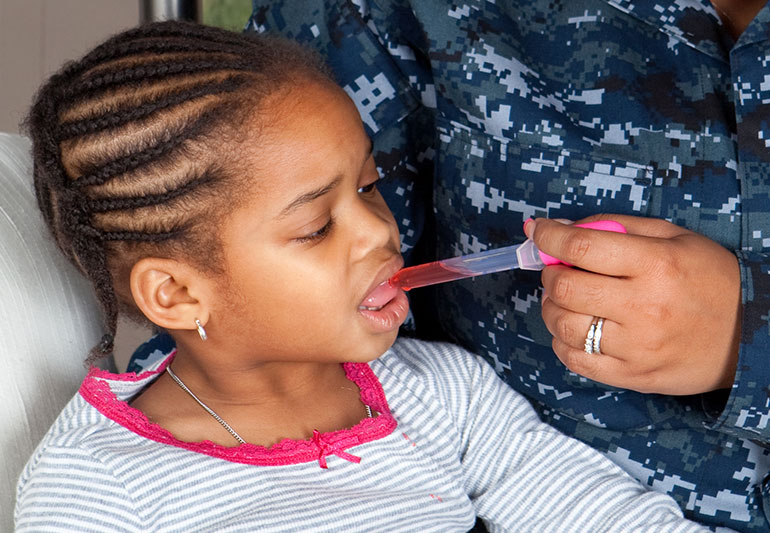

Your little one’s got the sniffles, and sneezes are sure to follow. But you’re at a loss as to which over-the-counter (OTC) medications are OK to give them. Can some hurt your child? Pharmaceutical Care Manager Alison Miller, explains.
Miller says it’s important to remember that supportive care is No. 1 for all ages. “These include providing a cool mist humidifier (avoid hot because it can burn a child) with a clean filter, fluids to prevent dehydration and lots of rest and TLC.”
In addition to these, Miller suggests using the following guidelines by age.
Ages 0 to 4
- Avoid cough & cold OTC products as these may be more risk than added benefit.
- Use acetaminophen and ibuprofen products under your doctor’s supervision, and be sure to follow the prescribed dosing directions.
- Use saline nasal spray and nasal bulb for suction to help clear little noses.
Ages 4 to 6
- Avoid cough & cold OTC products as these may be more risk than added benefit.
- Use acetaminophen, ibuprofen, antihistamines and steroid nasal sprays as recommended and be sure to follow age or weight-based dosing directions.
- Use saline nasal spray as needed.
Ages 6 to 12
- Use cough & cold OTC products under your doctor’s supervision and follow recommended dosing directions.
- Use acetaminophen, ibuprofen, antihistamines and steroid nasal sprays as recommended and be sure to follow age or weight-based dosing directions.
- Use saline nasal spray as needed.
Ages 13 +
- Use cough, cold and other OTC products to ease symptoms and follow recommended dosing directions.
- Only treat one symptom at time and avoid combining products.
- Use saline nasal spray as needed.
Take-home tips:
Match dose to strength. Medicines come in different concentrations. Use the right dose for your product’s strength.
Spoons aren’t reliable. Use the product’s measuring device or buy one at your pharmacy.
After age 1, honey helps. Giving ½ to 2 teaspoons of honey at bedtime can ease cough. Don’t try this before age 1. Honey can cause botulism in infants.
Remember Reye’s syndrome. Aspirin can cause this deadly illness in kids younger than 12. Use aspirin only if your doctor recommends it.
Follow these best practices:
1.Use OTC medication for short term duration.
2.OTC medications can have drug interactions, so be sure to check with your local pharmacist before administering.
3. Treat one symptom at time to avoid combining products.
4. Shake well on all suspension medications.
more recommended stories
 Pediatric Crohn’s Disease Microbial Signature Identified
Pediatric Crohn’s Disease Microbial Signature IdentifiedKey Points at a Glance NYU.
 High-Fat Diets Cause Damage to Metabolic Health
High-Fat Diets Cause Damage to Metabolic HealthKey Points Takeaways High-fat and ketogenic.
 Can Too Many Antioxidants Harm Future Offspring?
Can Too Many Antioxidants Harm Future Offspring?Key Takeaways High-dose antioxidant supplementation in.
 Human Antibody Drug Response Prediction Gets an Upgrade
Human Antibody Drug Response Prediction Gets an UpgradeKey Takeaways A new humanized antibody.
 Dietary Melatonin Linked to Depression Risk: New Study
Dietary Melatonin Linked to Depression Risk: New StudyKey Summary Cross-sectional analysis of 8,320.
 Type 2 Diabetes Risk Identified by Blood Metabolites
Type 2 Diabetes Risk Identified by Blood MetabolitesKey Takeaways (Quick Summary) Researchers identified.
 Microglia Neuroinflammation in Binge Drinking
Microglia Neuroinflammation in Binge DrinkingKey Takeaways (Quick Summary for HCPs).
 Durvalumab in Small Cell Lung Cancer: Survival vs Cost
Durvalumab in Small Cell Lung Cancer: Survival vs CostKey Points at a Glance Durvalumab.
 Rising Chagas Parasite Detected in Borderland Kissing Bugs
Rising Chagas Parasite Detected in Borderland Kissing BugsKey Takeaways (At a Glance) Infection.
 Can Ketogenic Diets Help PCOS? Meta-Analysis Insights
Can Ketogenic Diets Help PCOS? Meta-Analysis InsightsKey Takeaways (Quick Summary) A Clinical.

Leave a Comment